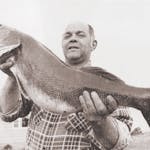This year the sweet smell of spring will include the stench of rotting fish — thanks to a remarkably long, cold and snowy winter.
Some two dozen lakes in central and southern Minnesota have suffered some winterkill because of low oxygen levels. And the longer that ice and snow lingers on lakes, the more fish are likely to die.
"We know there's significant dead fish,'' said Dave McCormick, assistant regional fisheries manager in St. Paul. "I don't think we've had this bad of a winter in 18 years.''
And if ice and snow persist on lakes, "this could get worse,'' he said.
Perhaps the most prominent — and surprising — lake to be affected so far is North Center near Lindstrom, where last week a patch of open water was choked with dead fish, including northerns, bass, walleyes and crappies, as well as carp and bullheads. Usually shallow lakes winterkill, but North Center is more than 40 feet deep in places and has no recent history of die-offs.
"It's pretty shocking,'' said Allan Nistler, 21, of Lindstrom, who fishes the lake and recently photographed the fish. Beneath the decaying rough fish on the surface were game fish, including big northerns, he said.
Other lakes where fish kills have occurred include Pelican and the north end of Maple Lake in Wright County; Little, Sunrise, Spider and north Goose lakes in Chisago County; Snail Lake in Ramsey County; Centerville Lake in Anoka County; and Long, North and South Stanchfield, Francis and Paul's lakes in Isanti County.
Meanwhile, popular Knife Lake north of Mora in Kanabec County had low oxygen levels, so aerators have been installed.
Revealing extent of kill
DNR officials won't know the extent of the fish kills until ice departs and they get reports of dead fish from lakeshore owners, or until they survey lakes with nets.
"As of today, we're just preparing for the worst, and if it's bad, we'll be doing more fish stocking than we normally would,'' said Jack Lauer, regional fisheries manager in New Ulm.
The brutal winter gets the blame. Fish die when oxygen levels drop too low to support them. Ice formed on lakes early and was quickly covered with snow, blocking sunlight from plants that produce oxygen. Those plants die, and the decaying matter consumes more of the limited oxygen.
If oxygen levels fall low enough, fish begin to die. Shallow lakes are most susceptible, and some suffer winterkills regularly.
Lauer said the first fish to die are game fish: walleyes, bass, panfish, perch and northern. Then rough fish such as carp, suckers and bullheads succumb.
"I'd say bullheads go last,'' said Lauer. "If we get [dead] bullheads … we know it's been a significant kill.''
North Center Lake woes
That's what officials fear happened on North Center Lake, because of the presence of dead carp and bullheads.
"We know there's a pretty good kill going on,'' said Roger Hugill, DNR area fisheries manager in Hinckley. "But it doesn't mean there won't be enough fish to re-establish the population.''
Officials and locals were stunned.
"I've never seen it winterkill,'' said Frankie Dusenka of Frankies Live Bait and Marine in Chisago City. "There's still 36-plus inches of ice around here; it's amazing.''
DNR officials drilled holes around the lake and found very low oxygen levels — 1 part per million or less. Normally, the level would be 8 to 12 parts per million.
Concerned, DNR biologists then checked neighboring waters, including South Center, Chisago, Green and South Lindstrom, and found the oxygen levels were fine.
A fishing hot spot wiped out
At Pelican Lake near Albertville in Wright County — a fishing hot spot in recent years — officials in late February detected oxygen levels of less than 1 part per-million. So the DNR opened the shallow lake for 10 days to liberalized fishing with no limits. Joe Stewig, DNR area fisheries manager, said anglers took lots of fish for a few days, but then it appeared many of the fish remaining in the lake died.
"We had 33 to 35 inches of ice — I can't remember the last time we had that much ice here,'' Stewig said. "I think we'll have a fair number of lakes with partial or full kills.''
Pelican's fish were destined to die, because the DNR plans to lower water levels to restore waterfowl habitat there. But for other lakes, including North Center, the fish loss can be significant. North Center won't be opened to liberalized fishing. "It's too late,'' said Hugill. But repopulation might occur there because the lake is connected to South Center Lake.
The DNR assesses lakes with winterkill and determines whether to restock them or let natural reproduction occur. Sometimes the fish kills can help a lake by removing rough fish or reducing the number of small game fish, allowing survivors to grow larger.
Meanwhile, officials are hoping spring arrives soon, bringing oxygenated snowmelt into lakes.
"What we need is a full week of warm weather,'' Hugill said.
When ice does leave, the DNR is expecting phone calls. Though many dead fish sink and decompose on lake bottoms, others wash ashore.
"People call when the ice goes out because you can't miss the stench of dead, rotting fish,'' McCormick said. "We're figuring it's going to be a busy spring for us.
Doug Smith • 612-673-7667






